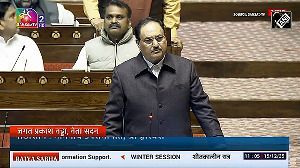 Most of the states have agreed to the new draft of the GST Bill. Some want more amendments and only a few, less than five in number, still have a different outlook on this, says Asim Dasgupta, chairman of the empowered committee of state finance ministers, and finance minister of West Bengal.
Most of the states have agreed to the new draft of the GST Bill. Some want more amendments and only a few, less than five in number, still have a different outlook on this, says Asim Dasgupta, chairman of the empowered committee of state finance ministers, and finance minister of West Bengal.
In a conversation with Saubhadra Chatterji, he says the states want the proposed GST Act should be flexible to address the need of imposing taxes. Excerpts:
After the Centre presented the new draft of the GST (Goods and Services Tax) Bill withdrawing its veto power, you said some states wanted some more changes. What are these changes the states are looking for?After Monday's meeting, we observed that most of the states are agreeable to the new draft of the GST Bill. Some states want some more amendments and only a few, less than five in number, still have a different outlook.
I think we have made some progress in Monday's meeting towards evolving a consensus on the GST Bill. We will soon hold talks with the Union finance minister.
The states are emphasising on retention of their rights. They also want some flexibility. They want the Act should be flexible to address the need of imposing taxes if there is any urgent need.
Under the proposed Act, two sections - 279 (a) and (b) - are related to these issues. The central government has already brought some changes in these two sections but the states want more changes in 279 (b). The states also want some more benefits out of some taxes.
Which states are still objecting to the GST Bill?
One of the reasons why I am continuing as the chairman of this committee is that I don't reveal information about individual states.
The Madhya Pradesh government has serious objections to the proposed Act. What are you hearing from them now?
The Madhya Pradesh government on Monday presented an alternative model of the GST but some states immediately raised objections to it. Some states wanted some more time to give their opinion. I have allotted them a month's time.
The Madhya Pradesh government wanted some interim arrangement but many states said since we have progressed so far, why should we settle for any interim arrangement?
You also invited Nandan Nilekani in the meeting. What role is he playing in these tax reforms?
We had invited Nandan Nilekani to give us a presentation. In the GST scheme, the information technology (IT) plays a major role. We already have a working group comprising members of different states. This team will now visit various states and feed data on the inter-state trades through the use of IT. This will help us reduce tax evasion.
Have the states reached any understanding among themselves on the issue of the floor rate?
Yes, the states have reached an agreement. But now the issue is to be decided between them and the Centre. That discussion is still going on. Please remember, GST in India is a highly complex issue.
Will the Centre be able to present the GST Bill in the Winter Session of Parliament?
That is what we are aiming at. I will have to hold a meeting with the Union finance minister. I don't know about the technicalities, but yes, I hope the Bill will be introduced in Parliament in its winter session. Political differences over the Bill have certainly narrowed down.






